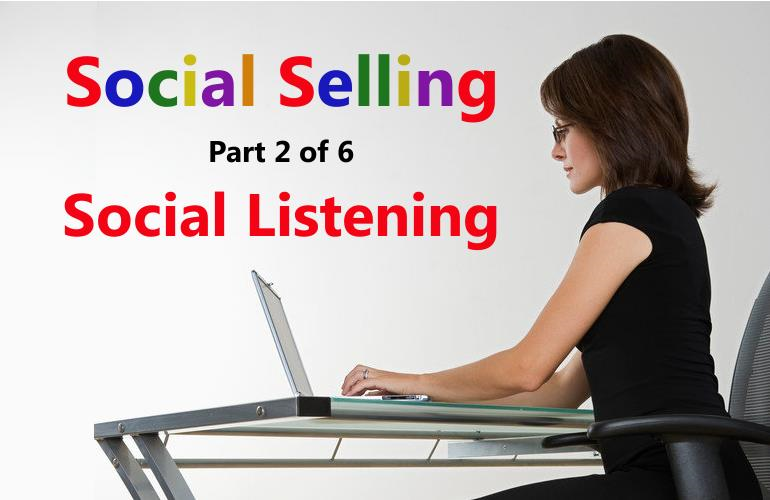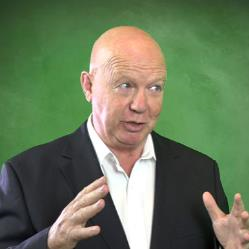
This article is part 2 of a 6 part series
- PART 1: Social selling defined and the success formula - 5 pillars
- PART 2: Pillar 1 - Social Listening
- PART 3: Pillar 2 - Social publishing
- PART 4: Pillar 3 - Social Research
- PART 5: Pillar 4 - Social Engagement
- PART 6: Pillar 5 - Social Collaboration
PART 2: B2B Social Selling - "Social Listening"
 In this second interview Tony Hughes states that his first B2B social selling pillar - 'Social Listening' - is where the power is.
In this second interview Tony Hughes states that his first B2B social selling pillar - 'Social Listening' - is where the power is.
We don't have to spam people with social messages - we can simply listen on 'social'. People communicate a lot of information about themselves and their organisations on social. Much of this relate to triggers that give us insight to changes occurring in their world - change that may create opportunity for us.
Tony provides some examples of triggers referenced in social media and how we can be listening for them. He also talks about some of the tools he uses to listen on social.
See the full interview below.
Tony is a leading author and keynote speaker in the word of B2B sales and sales leadership. He is well known for his strategic selling book "The Joshua Principle" and for the RSVPselling methodology.
See more of the 'TALKING SALES' series here
Interview
John: I'm here again with Tony Hughes - hello, Tony!
Tony: Hi, John!
John: Hey Tony, we've just talked - in the last discussion we had - about your definition of social selling, and the five pillars of social selling.
Tony: Yes.
John: What I'd like to do now is talk about the first of those five pillars.
Tony: Social listening'.
John: 'Social listening'. Tell me more about what you mean by 'Social listening'. I got a feeling I know it, but I'd like to get a better understanding.
Tony: Well, rather than blasting and spamming people with social messages, I actually think in a business-to-business, especially in an enterprise selling context, social listening is where all of the power is. People will jump into social to say that they're unhappy, either with us or a competitor, there will be things in social and media generally that get captured in Twitter and out on the Web, and there's affordable tools we can use to listen. Things like Hootsuite for example is a free tool that you can use, and you can listen for trigger events and for the names of brands that say "Hey, there could be an opportunity there."
John: Okay. Can you give me some examples, particularly in the B2B environment, of those sorts of things that you'd be listening for?
Tony: For example, in LinkedIn - in my world in helping organisations fix the way that they sell - if you have someone change roles in an enterprise, there's a new VP of sales that comes into run an organization...
John: That's a simple one, isn't it?
Tony: It is. And that's really a trigger event, because often the board or the CEO of that company has hired a new sales leader, a head of sales, because they want to change things up.
John: Okay.
Tony: If you're trying to sell to someone who's been in the role for many, many years, they tend to be pretty resistant to change, but a new person wants to do things differently.
John: There'd be lots of examples like that, so let's move on. So, in listening you're going to be using tools - you mentioned Hootsuite and so on - and then you're going to be capturing the triggers. What else do we need to know about listening?
Tony: The other thing about listening is listen to what the people that you're targeting actually talk about themselves, you'll get a sense of their values and interests and drivers, and that's where a platform like LinkedIn is actually very valuable. There's good groups in LinkedIn, where people will tend to be part of groups and they'll talk. And listen to Twitter, Twitter's a very, very powerful tool. I actually use a thing called TweetDeck to do my social listening in Twitter.
John: And I guess you're not just listening to what the executives might be saying. A lot of them aren't even in LinkedIn, right?
Tony: Yes.
John: But you're listening to what their people are saying, what their customers are saying, to get a feel for any triggers that are happening that you can then go and create a dialogue around.
Tony: Yes, it's true. We're not talking about it right now, but the whole concept of social research... that can only be done well, if you listen well. People expect us to turn up today and actually have insights about the thing that we want to talk about; not to talk about us and our product and what we sell, but to talk about them and their industry and their challenges and the trends, the things that are happening that are important to them, and we can only have those answers and have that insight, if we listen well.
John: Great topic. Listening on social media is where a lot of us don't do well enough, and I've certainly learnt a lot from you, Tony - thank you very much!
Tony: Thanks, John!
****************
More interviews with Tony Hughes:
***************

Your Invitation: I invite you to join the Sales Leader Forum group on LinkedIn where you can experience informative discussions with your peers and sales thought leaders on subjects like the one we have discussed here. I also invite you to subscribe to the
- Sales Leader Resource Centre here
- Sales Leader YouTube channel here (300+ sales leadership videos)
Please Share: If you valued this article, please share via your Twitter, LinkedIn, Google+ and Facebook social media platforms. I encourage you to join the conversation or ask questions. So feel free to add a comment on this post - I promise to respond. If inclined please follow my LinkedIn post page here.
Want to touch base? If you have questions please feel free to contact me - email: john.smibert(at)salesleaderforums.com, Phone: +61 404857893 or Skype: john.smibert